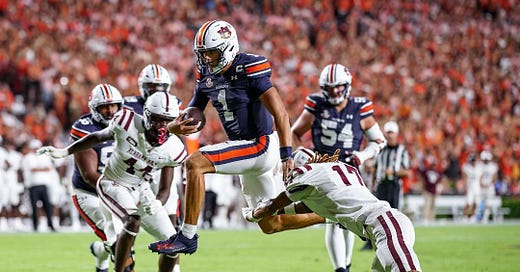In the age of digital everything, Auburn senior quarterback Payton Thorne has found himself at the intersection of football and fintech. After a tough 21-14 loss to California, Thorne’s inbox wasn’t just filled with the usual post-game analysis and motivational quotes. No, it was filled with Venmo requests from disgruntled bettors.
Appearing on “The Next Round,” Thorne shared his bemusement at the situation. “They’re definitely not sending cash,” he said with a chuckle, reflecting on the four interceptions he threw during the game. “It’s funny. When they lose money, they want their money back. But when they win money on a parlay, no one’s ever sent me any of the money.”
Imagine the scene: Thorne, fresh off the field, sweaty and exhausted, checks his phone only to find a slew of Venmo requests. “Hey Payton, you owe me $50 for that pick-six!” or “Bro, you cost me my rent money, pay up!” It’s like a modern-day twist on the old adage, “Don’t shoot the messenger.” In this case, it’s “Don’t Venmo request the quarterback.”
Thorne’s lighthearted take on the situation masks a more serious issue that the NCAA is actively monitoring. According to a study by Signify, an artificial intelligence company and NCAA partner, 1-in-3 high-profile college athletes receive messages from individuals with a “betting interest.” It’s a brave new world where athletes aren’t just playing for pride and scholarships but also for the financial well-being of anonymous bettors.
In response, states like Maryland, Louisiana, Ohio, and Vermont have banned sportsbooks from offering prop bets on college players. Because nothing says “we care about our athletes” like making sure they don’t get Venmo requests from irate gamblers.
But it’s not just college athletes who are feeling the heat. Professional athletes are also getting their fair share of digital panhandling. PGA golfer Max Homa revealed that bettors have tracked down his Venmo account and requested money from him multiple times per week. “That gets old,” Homa told The Washington Post. One can only imagine the frustration of opening your Venmo app to find a request that reads, “Hey Max, you missed that putt on the 18th. You owe me $100.”
The absurdity of the situation is not lost on Thorne, who seems to be taking it all in stride. After all, it’s not every day that you get to be the star quarterback and an unwilling participant in a financial transaction. Perhaps Thorne should start sending out his own Venmo requests. “Hey, thanks for the support! How about a tip for that 50-yard touchdown pass?”
As the NCAA continues to grapple with the implications of sports betting on college athletics, one thing is clear: the digital age has brought with it a whole new set of challenges. For now, Thorne and his fellow athletes will have to navigate the murky waters of Venmo requests and betting interests with a sense of humor and a thick skin.
So, the next time you place a bet on a college game, remember: if things don’t go your way, maybe just keep your Venmo requests to yourself. After all, these athletes have enough on their plate without having to worry about paying back your lost wagers.





